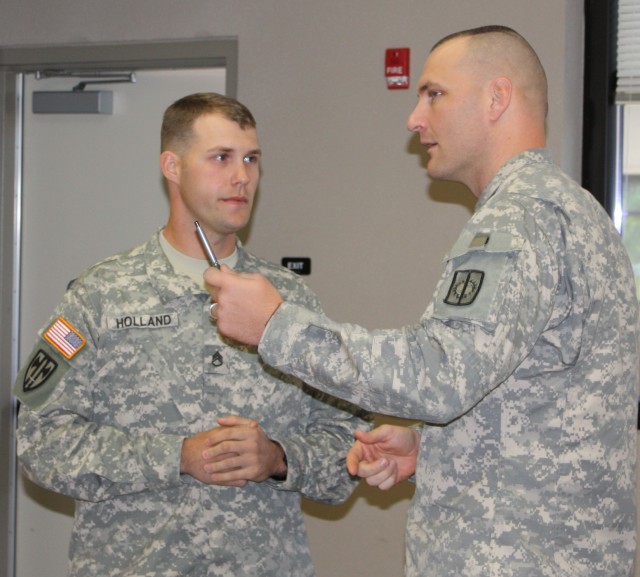WEST POINT, N.Y., Feb. 8, 2011 -- The U.S. Military Academy at West Point, N.Y., recently sent a five-person Negotiation Project Mobile Training Team to Schofield Barracks, Hawaii, to teach negotiation systems and strategies to noncommissioned officers and officers from the 728th Military Police Battalion.
The mobile training team, or MTT, consisted of Maj. Aram Donigian, Maj. Zachary Mundell, and Class of 2011 Cadets Matthew Mitchell, Mike Weich and Travis Zahnow.
Leaders of the 728th found themselves preparing for their immediate deployment by studying systematic negotiation approaches designed to help them in their mission of mentoring and transitioning the Afghanistan National Police and Border Patrol.
The West Point MTT introduced the concepts of challenging assumptions, defining a good outcome, conducting principled negotiation, dealing with difficult behaviors and multi-party negotiation to help these leaders prepare for the complex, cross cultural negotiations that await them.
"These ideas will help them as they face high stakes negotiations with various Afghan and American Soldiers," Zahnow said. "These MPs can use principled negotiation skills in every negotiation they encounter."
As the MTT taught their intensive, 24-hour course, they witnessed a behavioral change in the students from typical positional bargaining games to value creation and merit based principled negotiations. Every NCO and officer found tremendous application purposes for this negotiation model, using it to make sense of personal negotiation experiences, both at home and from previous overseas deployments.
They effectively moved from being accidental negotiators capable of juggling only one or two negotiation techniques to understanding how to choose between the more than 700,000 strategies that exist.
The challenge of transitioning the Afghanistan National Police and Border Patrol into effective fighting forces is not the only challenge awaiting the 728th. They also understand that the Afghanistan National Police they will be working with have had past relationships with Americans.
"We are the same, but different from the previous Soldiers who have served in Afghanistan over the last 10 years," said Staff Sgt. Joshua Holland, an S3 section NCO preparing for his fifth overseas deployment.
Holland understood that while his unit looks like and has similar objectives to their predecessors, the 728th must find creative, elegant solutions to be successful mentors. Recognizing that planning is vital to any operation and Sgt. 1st Class James Webster shared one key lesson learned from the MTT.
"You, as a negotiator, have to be deliberate in how you prepare for your negotiation," Webster said. "Preparation can help ensure the negotiator reaches better outcomes than those resulting from concession-based compromises."
Moving from a positional model of compromise to a more efficient, systematic approach allowed these leaders to see the benefits of creating multiple options.
"By learning how to generate creative options," said Sgt. Deon Washington, a former Marine on his third overseas deployment, "we can negotiate to create value and help all the parties involved in the negotiation."
The question "Should you always make an agreement'" was discussed several times throughout the course, as American officers often feel the pressure from their chain of command to reach any solution, even ones with extremely poor long-term consequences. The role-play exercises and structured debriefs demonstrated the power of well crafted commitments in improving relationships and helping parties resolve issues that otherwise seem impossible.
The course culminated in a multi-party negotiation used to address the varying concerns and interests of several parties at the negotiation table. As the students prepared for stakes much greater than a classroom scenario they each understood how important it is to acknowledge the importance of well-defined good outcomes with Afghan village leaders.
The power of an apology and understanding how to separate substantive issues from personal issues, dealing with both on their own merits, will have much more relevance when these police officers work on the Afghan border with Afghanistan National Police members and have to find common ground.
All three cadets were selected to participate in the MTT as teaching assistants and role players due to their successful completion of MG390, Negotiation for Leaders, a year ago. Not only did the MTT experience allow them to share valuable tools with the larger Army, it also gave them exposure to a unit less than two weeks from deployment.
"I feel lucky to have been able to assist the officers and NCOs here at 728th and am now even more excited to meet similarly talented leaders in my future as I transition from West Point to an infantry platoon leader," Weich said.
The West Point Negotiation Project conducts various Army outreach, research, and publication projects designed to enhance the ability of Army leaders to conduct effective negotiations in the complex and challenging situations they face both in combat and peace.
The WPNP is affiliated with the Network Science Center and West Point Leadership Center. For more information, please visit their website at www.wpnp.org.




Social Sharing